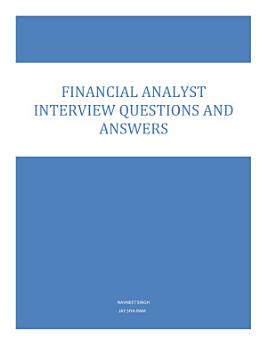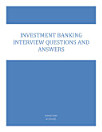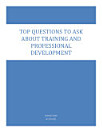Financial Analyst Interview Questions and Answers - English
About this ebook
1. Can you tell me about your experience as a financial analyst?
Answer: "In my previous role at [Company], I was responsible for conducting financial analysis, preparing reports, and providing insights to support strategic decision-making. I analysed financial statements, performed variance analysis, and forecasted financial performance. I also contributed to budgeting processes and participated in financial modelling projects to evaluate investment opportunities and business performance."
2. How do you approach financial modelling and forecasting?
Answer: "I approach financial modelling by first understanding the business objectives and the variables that impact financial performance. I gather historical data, analyse trends, and identify key assumptions. Using Excel or specialized financial modelling software, I build detailed models that simulate various scenarios and forecast future outcomes. I validate the models through sensitivity analysis and adjust assumptions based on market conditions or internal factors to ensure accuracy and reliability."
3. How do you analyse financial statements to assess a company's performance?
Answer: "When analysing financial statements, I start by reviewing the income statement, balance sheet, and cash flow statement. I assess profitability metrics such as gross margin and operating margin, liquidity ratios like current ratio and quick ratio, and leverage ratios such as debt-to-equity ratio. I compare financial ratios to industry benchmarks and historical trends to identify strengths, weaknesses, and areas for improvement. This holistic analysis helps in understanding the overall financial health and performance of the company."
4. Can you give an example of a complex financial analysis project you've worked on?
Answer: "In a previous role, I led a financial analysis project to evaluate the feasibility of expanding into a new market. This involved conducting market research, assessing potential revenue streams, and developing a financial model to forecast costs and expected returns over a five-year period. I performed scenario analysis to evaluate various market conditions and presented recommendations to senior management based on NPV (Net Present Value) and IRR (Internal Rate of Return) analysis. The project resulted in a strategic decision to enter the market, which contributed to revenue growth and profitability."
5. How do you stay updated with financial markets and industry trends?
Answer: "I stay updated with financial markets and industry trends through various channels. I regularly follow financial news, read industry reports and publications, and attend webinars and seminars. I am also an active member of professional associations such as [mention relevant associations], where I participate in networking events and discussions with industry experts. This continuous learning helps me stay informed about market dynamics, regulatory changes, and emerging trends that may impact financial analysis and decision-making."
6. How do you handle tight deadlines and multiple priorities as a financial analyst?
Answer: "Prioritization and time management are crucial in handling tight deadlines and multiple priorities. I use task management tools to organize tasks based on urgency and importance. I break down complex projects into smaller tasks and set realistic timelines for completion. Effective communication with stakeholders helps manage expectations and ensures alignment on priorities. I am proactive in anticipating potential challenges and adjusting plans as needed to deliver high-quality work within deadlines."
7. Describe a time when your financial analysis contributed to a significant decision or outcome.
Answer: "In a previous role, my financial analysis played a key role in optimizing the company's capital structure. I conducted a comprehensive analysis of the company's debt and equity financing options, considering factors such as interest rates, repayment terms, and impact on cash flow. Based on my analysis, I recommended restructuring our debt portfolio to lower interest expenses and improve liquidity. This decision saved the company significant costs and strengthened our financial position, which was positively recognized by senior management and stakeholders."
8. How do you communicate financial analysis findings to non-financial stakeholders?
Answer: "When communicating financial analysis findings to non-financial stakeholders, I focus on clarity and relevance. I avoid jargon and use visual aids such as charts, graphs, and concise summaries to simplify complex financial data. I highlight key insights, explain the implications of the analysis on business performance, and provide actionable recommendations. I encourage open dialogue and welcome questions to ensure stakeholders have a clear understanding and feel confident in making informed decisions based on the analysis."
9. What tools and software are you proficient in for financial analysis?
Answer: "I am proficient in using Excel for financial modelling, data analysis, and creating financial reports. I also have experience with financial analysis software such as [mention specific software relevant to your experience, e.g., Bloomberg Terminal, Tableau for data visualization, ERP systems like SAP or Oracle for financial data management]. These tools enable me to conduct in-depth analysis, perform scenario modelling, and present insights effectively."
10. How do you approach risk management in financial analysis?
Answer: "In financial analysis, I approach risk management by identifying potential risks, assessing their impact on financial outcomes, and developing strategies to mitigate risks. I analyse historical data and industry trends to anticipate risks such as market volatility, liquidity constraints, and regulatory changes. I incorporate risk factors into financial models and stress test assumptions to evaluate resilience under adverse scenarios. I collaborate with stakeholders to implement risk mitigation strategies and monitor risk exposure regularly to ensure proactive management."
These answers provide a foundation for addressing common financial analyst interview questions, demonstrating your skills, experience, and approach to financial analysis and decision-making. Tailor your responses to reflect your specific experiences and achievements in the field.








